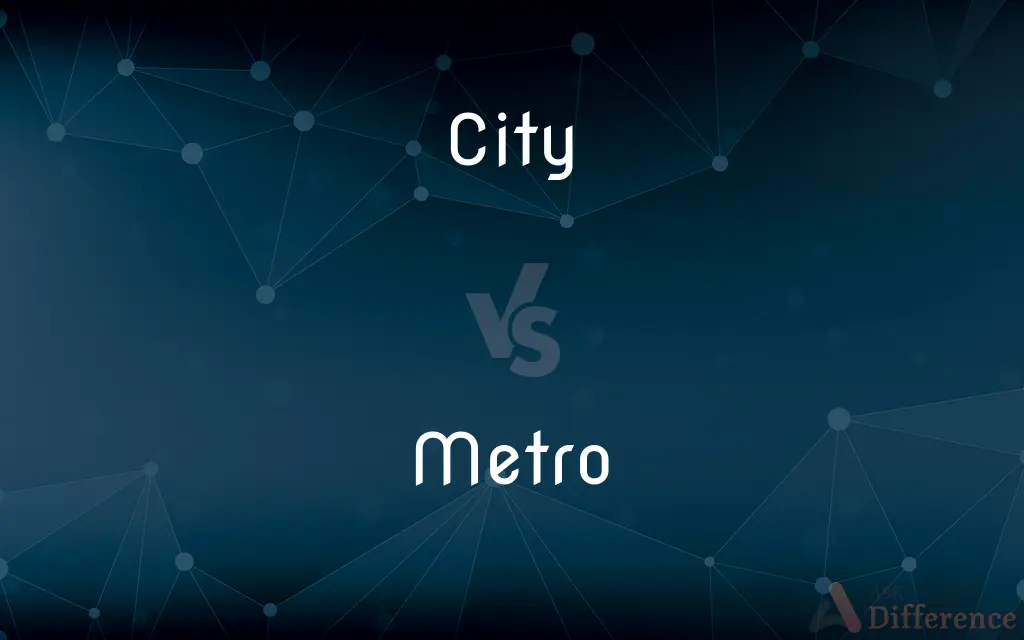City vs. Metro — What's the Difference?
By Tayyaba Rehman & Maham Liaqat — Updated on April 5, 2024
A city is a large and permanent human settlement, often significant in political, economic, and cultural terms, while a metro (metropolitan area) encompasses a city and its suburbs, representing a larger economic and social region.

Difference Between City and Metro
Table of Contents
ADVERTISEMENT
Key Differences
A city is defined by its specific administrative boundaries, characterized by a local government, and is often a hub for commerce, culture, and governance. Whereas a metro, short for metropolitan area, extends beyond a single city to include surrounding areas that are economically and socially integrated with the city, often including multiple municipalities.
Cities serve as focal points for political activities, housing government institutions and administrative offices. On the other hand, metro areas represent a broader socio-economic landscape, influencing policy and governance across multiple cities and towns that share economic and social ties.
While cities are known for their dense populations and urban infrastructure, metro areas encompass a mix of urban, suburban, and sometimes even rural environments, reflecting a diverse range of living spaces and community types.
Economic activities in cities are diverse, ranging from industrial, service, to tech sectors, concentrated within the urban core. In contrast, metro areas exhibit a complex economic ecosystem that extends these activities into surrounding regions, supporting a wider range of job markets and housing options.
Cultural and social opportunities, such as museums, theaters, and restaurants, are typically abundant in cities. Metro areas, however, offer a blend of urban cultural experiences and suburban leisure activities, catering to a broader audience with varied interests.
ADVERTISEMENT
Comparison Chart
Definition
A large, permanent settlement with defined administrative boundaries.
An economic and social region comprising a city and its suburbs.
Scope
Limited to administrative boundaries.
Extends beyond city limits to include suburban and sometimes rural areas.
Governance
Single local government.
Multiple local governments across cities and towns.
Economic Activities
Concentrated within the urban core.
Spread across urban, suburban, and rural areas.
Population Density
High, with dense urban development.
Varies, from dense urban to sparse rural areas.
Compare with Definitions
City
A city is an urban area with dense population and significant infrastructure.
New York City is known for its towering skyscrapers and bustling streets.
Metro
It is characterized by a shared economy and social life.
The San Francisco Bay Area is known for its tech industry and shared cultural identity.
City
Cities are centers for cultural, economic, and educational activities.
Paris is renowned for its cultural institutions and historical landmarks.
Metro
Metro areas often have multiple centers of activity.
The Los Angeles Metro area includes several business districts beyond downtown.
City
Cities are typically connected by public transportation networks.
London's extensive underground system facilitates urban mobility.
Metro
They offer a mix of urban and suburban living options.
The Dallas-Fort Worth metroplex provides a range of residential choices.
City
They often feature diverse communities and neighborhoods.
Toronto's diverse neighborhoods reflect its multicultural population.
Metro
A metro area includes a central city and its surrounding suburbs.
The Washington, D.C. metro area encompasses parts of Maryland and Virginia.
City
It is a legal entity governed by its own municipal charter.
The City of Los Angeles has its own mayor and city council.
Metro
Public transportation systems in metro areas often span multiple cities.
The Boston MBTA serves the city and its surrounding suburbs.
City
A city is a large human settlement. It can be defined as a permanent and densely settled place with administratively defined boundaries whose members work primarily on non-agricultural tasks.
Metro
(general) A rapid transit rail transport system, or a train in such systems, generally underground and serving a metropolitan area.
City
A large town
One of Italy's most beautiful cities
The city council
Metro
(less common) An urban rapid transit rail transport system, normally with lighter track and light trains (i.e. an S-Bahn or similar), or a train in such systems.
City
Short for City of London
Metro
A metropolitan area.
City
A center of population, commerce, and culture; a town of significant size and importance.
Metro
Metropolitan
City
An incorporated municipality in the United States with definite boundaries and legal powers set forth in a charter granted by the state.
Metro
Electric underground railway
City
A Canadian municipality of high rank, usually determined by population but varying by province.
City
A large incorporated town in Great Britain, usually the seat of a bishop, with its title conferred by the Crown.
City
The inhabitants of a city considered as a group.
City
An ancient Greek city-state.
City
(Slang) Used in combination as an intensive
The playing field was mud city after the big rain.
City
City The financial and commercial center of London. Used with the.
City
A large settlement, bigger than a town; sometimes with a specific legal definition, depending on the place.
São Paulo is the largest city in South America.
City
(UK) A settlement granted special status by royal charter or letters patent; traditionally, a settlement with a cathedral regardless of size.
City
(Australia) The central business district; downtown.
I'm going into the city today to do some shopping.
City
(slang) A large amount of something used after the noun.
It’s video game city in here!
City
A large town.
City
A corporate town; in the United States, a town or collective body of inhabitants, incorporated and governed by a mayor and aldermen or a city council consisting of a board of aldermen and a common council; in Great Britain, a town corporate, which is or has been the seat of a bishop, or the capital of his see.
A city is a town incorporated; which is, or has been, the see of a bishop; and though the bishopric has been dissolved, as at Westminster, it yet remaineth a city.
When Gorges constituted York a city, he of course meant it to be the seat of a bishop, for the word city has no other meaning in English law.
City
The collective body of citizens, or inhabitants of a city.
City
Of or pertaining to a city.
City
A large and densely populated urban area; may include several independent administrative districts;
Ancient Troy was a great city
City
An incorporated administrative district established by state charter;
The city raised the tax rate
City
People living in a large densely populated municipality;
The city voted for Republicans in 1994
Common Curiosities
What roles do cities play within a metro area?
Cities serve as the central hubs for economic, cultural, and political activities within a metro area.
Are there any metro areas without a central city?
Most metro areas are defined by the presence of a central city, but some may have multiple cities of similar size and importance without a single, clear center.
What is the main difference between a city and a metro area?
A city is a single urban entity with its own government, while a metro area encompasses a city along with its surrounding suburbs and towns, forming a larger economic and social region.
How is the population of a metro area determined?
The population of a metro area includes all residents within the urban core as well as those in the suburban and sometimes rural areas that are economically tied to the city.
How do educational opportunities compare between cities and metro areas?
Both cities and metro areas offer a range of educational opportunities, but larger metro areas may offer more diversity in terms of schools, colleges, and universities.
How does public transportation differ between cities and metro areas?
Public transportation in cities focuses on dense urban networks, while in metro areas, it may also include regional connections between cities and suburbs.
Which has a more diverse economy, a city or a metro area?
Metro areas often have more diverse economies due to the larger geographical area and variety of industries across urban and suburban zones.
What governs a metro area?
Metro areas are governed by a combination of local governments and sometimes regional authorities that coordinate across multiple jurisdictions.
Can a city be part of more than one metro area?
Typically, a city is central to one metro area, but nearby metro areas can overlap or be interconnected economically and socially.
Do cities or metro areas have higher population densities?
Cities typically have higher population densities, whereas metro areas include a mix of dense urban and less dense suburban or rural areas, leading to varied densities.
Can a metro area cross state lines?
Yes, some metro areas, like the New York City metropolitan area, cross state lines, encompassing parts of neighboring states.
How do cultural offerings compare between cities and metro areas?
Cities often concentrate cultural institutions and events, while metro areas provide a wider array of cultural and recreational activities across different communities.
What impact do cities have on their surrounding metro areas?
Cities drive the economic, cultural, and social dynamics of their metro areas, influencing growth and development patterns in surrounding regions.
How are metro areas identified and defined?
Metro areas are defined by government agencies based on criteria such as economic interdependence, commuting patterns, and population density.
Is it more expensive to live in a city or a metro area?
Living costs can vary widely, but central city areas are often more expensive due to higher demand for housing and services, compared to suburban parts of a metro area.
Share Your Discovery

Previous Comparison
Tethering vs. Hotspot
Next Comparison
Shut vs. CloseAuthor Spotlight
Written by
Tayyaba RehmanTayyaba Rehman is a distinguished writer, currently serving as a primary contributor to askdifference.com. As a researcher in semantics and etymology, Tayyaba's passion for the complexity of languages and their distinctions has found a perfect home on the platform. Tayyaba delves into the intricacies of language, distinguishing between commonly confused words and phrases, thereby providing clarity for readers worldwide.
Co-written by
Maham Liaqat













































